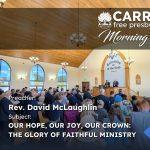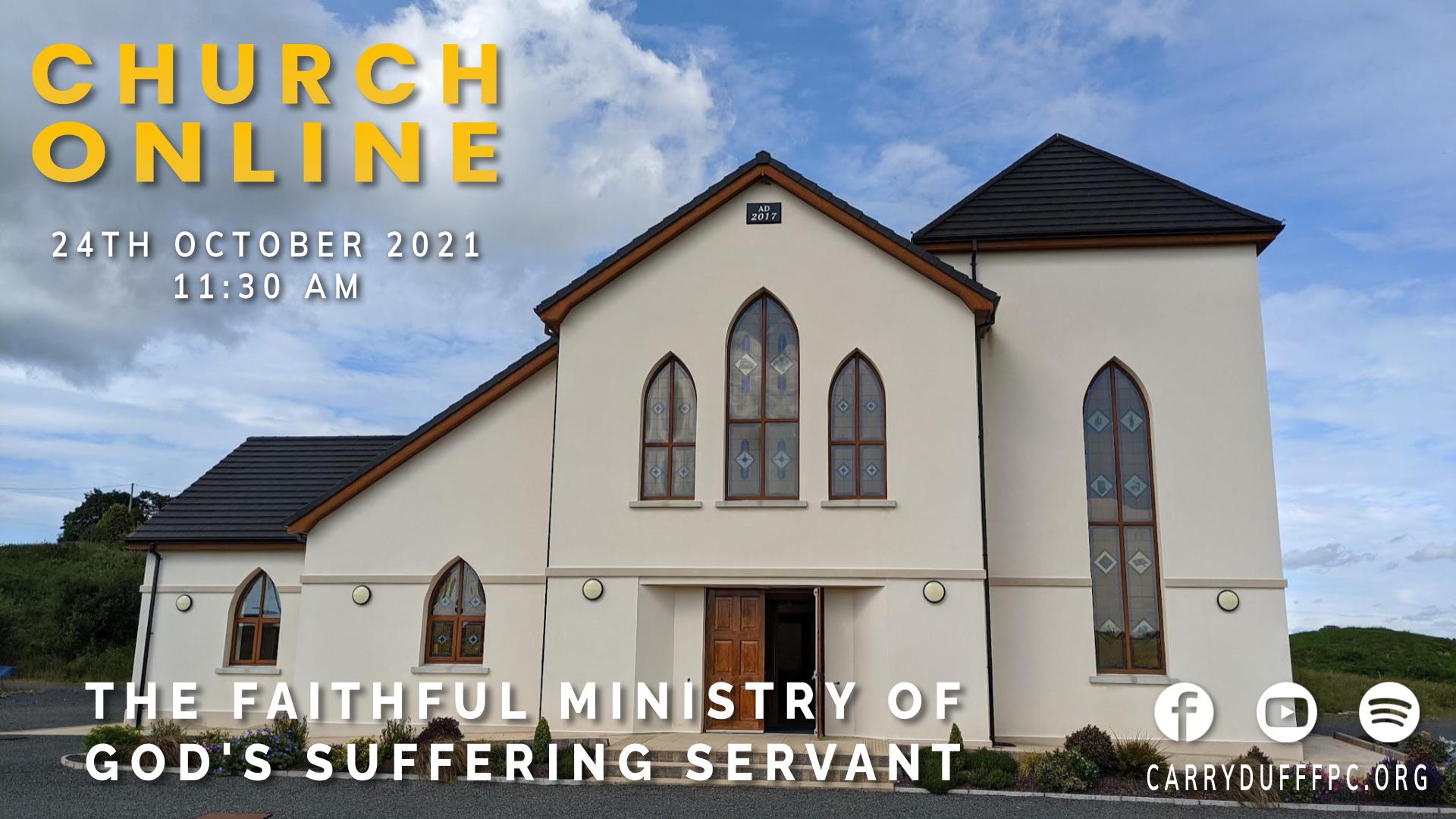Date: SUN 11:30am 10th August 2025
Preacher: Rev. David McLaughlin
Bible Reference: 1 Thessalonians 2:4
But as we were allowed of God to be put in trust with the gospel, even so we speak; not as pleasing men, but God, which trieth our hearts.
Sermon Summary: The Features of a Faithful Ministry
The sermon focuses on 1 Thessalonians 2:1-12, with an emphasis on verses 1-6, under the title “The Features of a Faithful Ministry.” The preacher explores the Apostle Paul’s ministry in Thessalonica, presenting him as a model of pastoral care and evangelistic zeal. The sermon is structured around three key aspects of Paul’s ministry: the godly message he treasured, the godly manner he testified, and the godly method that was testable. Below is a detailed summary in UK English, capturing the main points and themes.
Introduction
The sermon begins with a reading from 1 Thessalonians 2:1-12, where Paul reflects on his ministry among the Thessalonian believers. The preacher notes that while 1 Thessalonians 1 introduces Paul as a preacher, chapter 2 portrays him as a pastor who nurtures new converts. The sermon aims to address two central questions:
- Are you a genuine disciple of Jesus Christ, saved by grace and transformed by His power?
- Are you actively discipling others to become more like Christ?
These questions frame the sermon’s challenge to the congregation to live as authentic Christians and to help others grow spiritually, following Paul’s example.
Context of Paul’s Ministry
Paul arrived in Thessalonica after facing severe persecution in Philippi, where he was beaten and imprisoned. Despite this opposition, he remained steadfast in preaching the gospel. In Thessalonica, he encountered further accusations from detractors, particularly Jews, who sought to discredit his ministry by spreading falsehoods. These accusations included claims of deceit, impurity, and greed. Paul’s response, as outlined in the passage, reveals the integrity and authenticity of his ministry.
The preacher underscores that trials are part of God’s plan to test and strengthen believers’ faith, deepen spiritual growth, and produce patience and wisdom. Paul’s faithfulness in the face of adversity serves as a model for Christians today.
1. The Godly Message Paul Treasured
The first feature of Paul’s faithful ministry is his reverence for the gospel as a sacred trust. The sermon highlights several key points about the gospel:
- Divine Origin: Paul did not invent the gospel or learn it from human sources; it was revealed directly by God (verse 4). To reject the gospel is to reject God Himself.
- Sacred Responsibility: The gospel is described as a priceless treasure entrusted to Paul and, by extension, to all believers. The preacher compares this to a family heirloom passed down with great care, emphasising the privilege and duty of sharing it faithfully.
- Unique Value: Unlike other religions, which rely on works-based righteousness (e.g., Buddhism, Judaism, Islam, or Roman Catholicism), the gospel offers salvation by grace alone, through faith alone, in Christ alone (Ephesians 2:8-9). Good works are the fruit of salvation, not its basis.
- Transformative Power: The gospel provides forgiveness of sins, redemption through Christ’s blood, and freedom from sin’s penalty and power (Isaiah 43:25; Ephesians 1:7). It is the ultimate good news, yet it is often rejected because it exposes human pride and sinfulness.
- Urgency of Proclamation: The gospel warns of eternal judgment and the reality of heaven and hell. Paul did not shy away from these truths, even when opposed, unlike some modern preachers who avoid topics like sin or judgment.
The preacher challenges the congregation to know, love, and share the gospel clearly, asking whether they could explain it to someone seeking salvation (e.g., using the Romans Road or the Wordless Book).
2. The Godly Manner Paul Testified
The second feature is Paul’s exemplary conduct, which reflected his commitment to the gospel and the people he served. Despite suffering in Philippi, Paul remained bold and uncompromising in Thessalonica (verse 2). Key aspects of his manner include:
- Holy Boldness: Paul did not water down the gospel or retreat from preaching, even under persecution. His dedication was likened to a wrestler facing fierce opposition, requiring strength and resolve.
- Sincere Appeal: Paul’s exhortation (verse 3) was not rooted in deceit, impurity, or guile. He made a persuasive call for sinners to repent and believe, akin to Moses’ appeal, “Who is on the Lord’s side?” (Exodus 32:26). His preaching was not about personal gain or popularity but about glorifying God.
- Integrity Under Scrutiny: Paul refuted accusations of deceit (deluding people), impurity (immoral conduct), and guile (manipulative flattery). He lived transparently, knowing that God tests the heart (verse 4). His ministry was not a façade; he avoided hypocrisy, greed, or hidden sins like pornography or abusive behaviour.
- Selfless Love: Paul’s affection for the Thessalonians was evident in his willingness to give not only the gospel but his own life (verse 8). He worked night and day to avoid burdening them financially (verse 9), demonstrating humility and care, like a nurse cherishing her children or a father guiding his family (verses 7, 11).
The preacher urges the congregation to emulate Paul’s integrity, boldness, and love for others, ensuring their lives align with their profession of faith.
3. The Godly Method That Was Testable
The third feature is the testable authenticity of Paul’s ministry. His life and methods could withstand scrutiny, as evidenced by:
- Living for God’s Glory: Paul’s primary aim was to please God, not men (verse 4). His heart was tested by God, ensuring his motives were pure.
- Enduring Trials with Joy: Despite persecution, Paul rejoiced in the Lord (Philippians 4:4). He did not complain or threaten to quit, recognising trials as part of spiritual warfare.
- Sound Doctrine: Paul preached foundational truths (e.g., Christ’s incarnation, atonement, resurrection, and second coming), fostering spiritual health in the Thessalonian church.
- Moral Uprightness: Paul avoided any appearance of evil, maintaining financial integrity and rejecting greed. His ministry was not a pretext for personal gain.
- Personal Testimony: In Acts 28:23-24, Paul’s ministry involved explaining Scripture, testifying to God’s kingdom, and persuading others about Jesus. His personal transformation validated his message.
The preacher illustrates this with a story about an atheist who, disillusioned by hypocritical Christians, hired a private investigator to examine the life of a Bible college president. The president’s impeccable character led to the atheist’s conversion, underscoring the power of a consistent Christian life.
Application and Challenge
The sermon concludes with a call to self-examination:
- Are you a genuine believer? Have you been saved by grace and transformed by Christ?
- Are you discipling others? Is your aim to help others grow spiritually, as Paul did?
- Does your life pass the test? If investigated, would your conduct reflect the gospel’s truth and integrity?
The preacher also addresses a contemporary issue, refuting a false accusation against a church elder for allegedly supporting transgenderism. He calls for Christians, especially those in educational roles, to oppose unbiblical ideologies boldly and stand for gospel truth.
Conclusion
The sermon presents Paul’s ministry as a model for all believers, emphasising the sacredness of the gospel, the integrity of Christian conduct, and the importance of a life that glorifies God. The congregation is urged to treasure the gospel, testify to it with boldness and love, and live in a way that withstands scrutiny, ensuring their ministry reflects the features of a faithful servant of Christ.
Subscribe to the podcast here:
Spotify Podcasts | Apple Podcasts | Pocket Casts
Email | RSS | more information here








